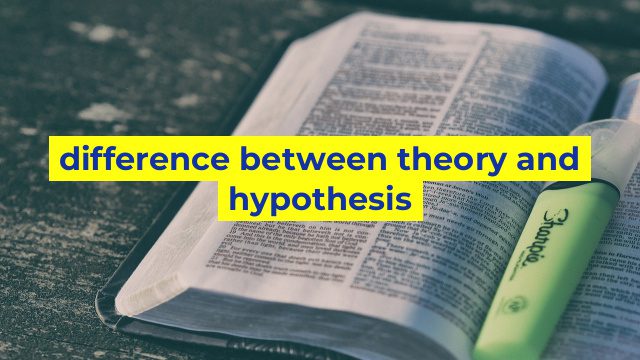The Difference between Theory and Hypothesis: Understanding Scientific Concepts
As a student or professional in the scientific field, it’s essential to understand the difference between a theory and a hypothesis. While both concepts are crucial to scientific inquiry and the formation of new knowledge, they refer to different stages of the scientific process. This article will explore the differences between theories and hypotheses and how they fit into the scientific method.
What is a Hypothesis?
A hypothesis is an educated guess based on limited evidence or observations. It is a statement that proposes a possible explanation for a phenomenon or scientific observation. One of the most significant features of a hypothesis is that it is unproven and requires further testing to determine its validity. The purpose of a hypothesis is to guide the scientific inquiry – by providing a foundation for developing predictions and designing experiments.
For example, if a scientist observes that plant growth improves in the presence of sunlight, a possible hypothesis could be, “The availability of sunlight affects plant growth.” To test this hypothesis, the scientist would need to design experiments in which sunlight is either present or absent, and plant growth is measured and compared.
What is a Theory?
A scientific theory is a well-established explanation of a natural phenomenon based on decades of research and experimentation. Scientific theories are broader and more complex than hypotheses, as they can explain a range of phenomena and have been backed up by multiple lines of rigorous experimentation and evidence. Scientific theories are always open to revision with new discoveries, but they are not quickly overturned.
For example, the theory of evolution is a well-established framework that explains the diversity of life on earth. It is based on decades of research from multiple scientific fields, including genetics, paleontology, and ecology. While scientists continue to refine and expand our understanding of evolution, the broad principles of the theory are well-supported by a wealth of evidence.
Summary
In summary, a hypothesis is an educated guess about the possible explanation of a phenomenon that requires further testing to determine its validity, while a theory is a well-established explanation of a natural phenomenon backed up by multiple lines of evidence from scientific research.
While hypotheses and theories are different, they are also interconnected. Hypotheses are the foundation for scientific investigation, and theories are the ultimate goal of scientific inquiry. Both are essential in scientific research, as hypotheses provide guidance on what to investigate, and the development of a theory requires the accumulation of rigorous research.
Overall, understanding the difference between theories and hypotheses is critical for anyone involved in scientific research, as these concepts play a central role in the scientific method and help us build a deeper understanding of the natural world.
Table difference between theory and hypothesis
| Theory | Hypothesis |
|---|---|
| Well-established explanation that has been supported by extensive testing and experimentation | An explanation for a phenomenon that needs to be tested through experimentation |
| Can be used to make predictions and guide future research | Is a proposed explanation that needs further testing before it can be accepted as a theory |
| Often involves complex abstract concepts and principles that are difficult to understand without specialized knowledge | Is simpler and more straightforward, based on observations and initial experiments |
| Examples include the theory of evolution, the theory of relativity, and the theory of gravity | Examples include the hypothesis that a new drug will be effective in treating a disease or the hypothesis that high levels of pollution are causing harm to the environment |

